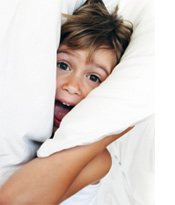Sweet Dreams with Homeopathy

Those parents who have witnessed their child go through night terrors know exactly how traumatic an experience it can be. You hear your child cry out in that chilling shriek. You rush in and turn on the light, knowing you can’t reach them. You try to bring them gradually out of their unreachable oblivion which seems to last forever. Then your child screams at something just over your left shoulder and you feel your skin prickle, wondering what on earth (or not on earth) it is that your child can see. Because the only thing you can see when you look around is empty space. But it’s enough to make you wonder what if there really is something there?
There is no mistaking a night terror for a nightmare. Nightmares typically occur during deeper sleep and don’t involve shrieking with open eyes at something nobody else can see. There are some children who will only ever experience a night terror once in their life during a fever, others every night. It depends on many different factors. But for those whose children suffer from regular night terrors, have you ever wondered why some kids get it and some don’t.
In conventional treatments there’s not much that can be done to help children with night terrors, and I’ve seen very few other treatments that can reliably assist in this distressing condition. One modality that can work wonders with night terrors is homeopathy, as it has an affect on the deeper emotional levels to gently rebalance from within. In fact, homeopaths see the immune system existing and operating not just on the physical level, but on the emotional and mental levels as well. I will go into this in a little more detail later on, but now let’s take a closer look at how and why night terrors happen.
Why do night terrors happen?
Night terrors and other sleep phenomena have been a much studied realm of science. Typically appearing out of nowhere and relatively common in children around three years old, some unlucky kids (and their parents) suffer until up to twelve years old. Often a night terror will hit around 90 minutes after your child has fallen asleep, which corresponds with the change in one stage of sleep they are in, to another.
It may be possible to link your child’s night terrors to a distressing event if they are due to some kind of post traumatic response, and many parents will say their child started having night terrors after a disturbing occurrence. However, there are plenty of small children whose parents can’t think of any reason as to why it may be happening. So let’s have a look at some of the other possible triggers that may bring on night terrors.
Being over tired can trigger night terrors
Most parents would have some experience with being severely overtired at some stage or other in their careers as parents. It’s likely you may have felt some or even all of the following on occasion: being wired and unable to sleep, extremes of emotion such as anger, distress, upset to the point of sobbing or shrieking like a banshee over mini-disasters (such as running out of tomato sauce at dinner time), or an increase in irrational fears and anxieties. read more here
Severe sleep deprivation can literally scrape away that layer of self control we have so diligently worked hard at cultivating so we don’t end up dissolving into hysterics at the mere hint of something going wrong. From a child’s point of view, the world makes even less sense than for an adult. There is even less control over that animal fight/flight, baseline survival type terror that rises up when the messy stuff hits the fan. I suspect we all have some kind of terror reflex stored in our cellular memory which comes out at times like this and takes over our rational mind. For a child, this layer is very close to the surface. Ensuring a good sleep routine would be the first thing I’d recommend to help to reduce the incidence of recurring night terrors.
Bed time routine and reducing night terrors
It may seem obvious but we all forget sometimes just how sensitive little ones are to the horrors they see on the news, or other television shows we hardly even notice. (Which are often on at the time when they’re most likely to take their worries to bed with them). Be mindful of what they’re exposed to, especially in the couple of hours leading up to bedtime. Sometimes it’s almost impossible to avoid yelling and screaming when it’s at that time of evening and the kids (and often parents) are over tired, wanting only to use the new couch as a trampoline and run away when it’s time to clean their teeth or get herded into bed. These kinds of situations happen in most households and many parents I know (myself included) find it extremely difficult to keep cool, especially when there are two or more little crazy people to make that experience all the more lively!
If your child is a night owl, one suggestion may be for the first week to start their official bedtime at the time they naturally feel tired (especially if it’s a battle trying to get them off to sleep any earlier). There’s no point setting official bedtime at seven thirty if they naturally don’t fall asleep until ten o’clock, but don’t worry. You can gradually trick them into it. For the second week, try adjusting the bedtime to fifteen minutes earlier, say nine forty five. Do this for at least a week to allow your child to get used to it. Then each subsequent week shave fifteen minutes off until you have the desired bedtime. This takes perseverance and consistency but for most little ones it works a treat, and they won’t even know it’s happening!
Certain foods and night terrors
Given that it’s not always possible to guarantee a good night’s sleep for either yourself or your children, for those who have literally tried everything to get their kids into the best sleeping pattern they can, the next thing to look at is their diet. If your kids are even the least bit sensitive (which most kids are), they may be reacting to certain substances that are common in many processed foods. Let’s check out a couple of very common chemicals in processed foods that make those foods so appealing for children.
MSG: This would have to be one of the worst offenders for causing over-excitability to the nervous system, and one of the chemicals that make so many snacks taste delicious to little sensory-greedy tongues. The full name is monosodium glutamate and the most important thing about this substance is that glutamatic acid is an excitatory neurotransmitter in the brain. MSG has a very high percentage of glutamic acid which can cause many other problems as well. read more here
This means that if you eat MSG, it’s likely that you may be overstimulating your nervous system. And for anyone who has ever been in close association with a toddler, you may have noticed that the LAST thing small children need is to be in any way overstimulated!
Chemical intolerances to processed food present in a huge variety of symptoms, many on the mental/emotional level. It may seem that your child is channelling the devil, when really they’re just reacting to something in the party franks. It’s important to ensure that these foods are kicked out of the diet if you have even a glimmer of an inkling that they may be involved. read more here
So now that you’ve cut out as much processed food from your child’s diet as you can, what about naturally occurring chemicals in foods? Does your child get rashes around the mouth and then fly into a vicious rage after eating broccoli? Or you may only notice a slight edginess or more fear at bedtime. It could even be very subtle and you may not notice anything at all until the shrieks at eleven o’clock when you’re just drifting off into deep sleep. Foods such as strawberries, tomatoes, eggplant and potatoes which have gone a greenish tinge are among the highest in a substance called salicylates, which can upset some children to an extreme degree. You may also want to think about the fact that strawberries (which I have listed first for a very good reason) are the most heavily sprayed foods that you can get, and absorb a huge percentage of toxic pesticide residue. Tomatoes are up there for having a super high pesticide residue as well. These foods may seem healthy and delicious, but can actually be terribly harmful for even your non salicylate sensitive children if eaten in large quantities, unless they are organic.
So, back to salicylates, which can be found in foods that are extremely nutritious for most of us, or a disaster for those with a salicylate sensitivity. Unfortunately these sensitivities are on the rise and can cause all kinds of weird and wonderful symptoms. Most commonly though, salicylates in those sensitive to them can induce extreme nervous stimulation which may manifest as hallucinations, delirious behaviour, crazy, mad running around like the Tassie devil in loony tunes, or bouts of extremely violent behaviour. And of course, one other common outcome of high salicylate intake for those who are sensitive, are night terrors. I’ve included a link to a website here that explains the salicylate issue further.
Foods to eat to help with peaceful and terror-free sleep
Foods that induce certain hormones and other substances to assist the body to sleep better include quality proteins and fats as well as good carbs, such as root vegetables (sweet potato, carrots, beets, parsnip etc). The low salicylate vegetables are also very helpful as they contain minerals and vitamins supportive to sleep. Here is a list of some more foods that may help with a peaceful night’s sleep.
Overheating, fevers and night terrors
Some little ones are just powerhouses of heat and in my clinic it’s often these ones who become overheated and then the screams start. Note that the body’s thermostat is located in the hypothalamus, which is also responsible for many other functions such as hormonal regulation, maintaining a general state of balance in the body and moods. The hypothalamus also, interestingly, has a hand in behaviour regulation. I can only theorise, but I do wonder if this is the reason that relatively sudden increases in body temperature can be a trigger for night terrors. read more here
Just as external heat of too many covers can be a potential trigger, so can internal heat. The hypothalamus is the area of the brain that will set the inner thermostat to a higher temperature and cause the body to have a fever if there is a need to attack an infection. There are many children who have night terrors only when they are either about to come down with an illness, or at the initial stage when there is a fever, and a pretty decent part of my practice is occupied with helping mums and little ones deal with fevers.
Night terrors and Homeopathy
There is a considerable treatment gap in conventional medicine when it comes to night terrors, which is really a nice way to say that there’s nothing that anyone can really do about it, aside from follow the prevention tips above. But what happens if you’ve done everything you can to prevent it from happening and you’re still woken up at all hours of the night by a child with recurring night terrors? It’s not something you even want to see once in your child, let alone on a regular occasion. This is where homeopathy can shine, as it offers one of the only treatments in existence for night terrors. read more here
Homeopathy works on an individual basis where each child is treated differently, depending on their exact symptoms. Some children will have super high fevers and this may be the only time they will experience night terrors. Other kids will have had stressful events which will spark them off in a recurring way, and these events may even be connected to a traumatic birth situation. As said earlier, there may be no known link to any cause.
There are certain homeopathic remedies that can help to treat kids who suffer from many different types and occurrences of night terrors. And just remember, when it comes to any issue whether it’s a common cold or sleep issues, each child’s experience will be different. Not only do homeopathic treatments have a great track record with helping night terrors, it’s also common for parents to report back that their child is generally happier in themselves, healthier in other ways and eating better as well. Proper treatment works on the whole person and not just one aspect of their health.
When you go to see a homeopath, don’t be surprised if they ask other seemingly unrelated questions about your child’s behaviour, eating habits and fears as a homeopath sees all of these areas as related. This is the single most fantastic aspect of homeopathy and why so many people around the world are choosing this amazing and fascinating modality for maximising their health.
- The importance of Muscle Mass in menopause - 12/03/2025
- Penny’s gluten free bread recipe - 14/10/2024
- Children and bedwetting: What can parents do to help? - 01/10/2024




Leave a Reply